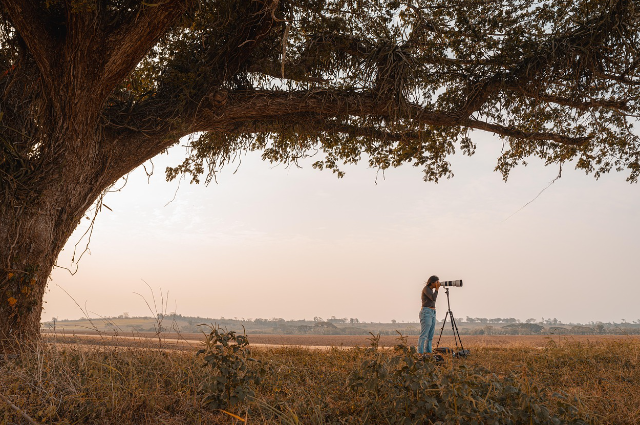
Most people think of photography as a way to save memories — a sunset that made you stop for a second, a smile you never want to forget, or a street moment that felt too alive to ignore. But the more time you spend with a camera, the more you realise it teaches you something deeper. It slows you down. It makes you notice things you normally rush past. A photograph becomes less about the picture itself and more about the quiet moment when you decided it was worth capturing.
There’s a kind of stillness that comes with holding a camera. The Humber Recovery and Wellbeing College once described the process almost like meditation, and honestly, that feels true. When you're waiting for the right light or adjusting your focus, your mind stops racing. You become present without even trying. For a few seconds, the world shrinks to one frame, one detail, one breath.
Researchers call this mindful photography. It’s the practice of really paying attention — not just snapping whatever is in front of you, but observing the small things that usually get lost in the rush of everyday life. Medical Daily explains that even taking just a few thoughtful photos a day can shift your mood and help you appreciate the ordinary moments you usually overlook.
Photography can also say things we struggle to put into words. According to Finding North, many people use it as a way to express emotions they don’t know how to talk about. Sometimes a photograph of an empty chair, or sunlight slipping through a window, captures a feeling better than a sentence ever could.
Research backs this up. A review on PubMed found that methods like photovoice help people understand their own experiences more clearly. Participants take photos of things that reflect their emotions, struggles, and victories. When they share these images, they aren’t just showing pictures — they’re sharing pieces of themselves. This kind of storytelling builds connection, understanding, and sometimes even healing.
Real-life stories show the same thing. The Pinehouse Photography Club in Saskatchewan, which began as a space for teens facing mental health challenges, discovered that taking photos outdoors helped shift attention away from negative thoughts. Something as simple as photographing a frozen lake or a quiet patch of forest helped the youth feel grounded again.
Even outside structured programs, photography brings people together. Stephen Walton, a tutor who has guided hundreds of students, often says that sharing your work — even imperfect shots — builds confidence and community. It’s comforting to know that someone else sees beauty in the same things you do.
There’s science behind the emotional benefits, too. The Wellness Society points out that nature photography can lower stress and help calm the mind. This connects to the Attention Restoration Theory, which says that natural scenes restore mental energy because they gently capture our attention. It explains why a forest path or a soft sunrise feels soothing, even when viewed on a screen.
Photography also sharpens memory and helps us make sense of our lives. A study mentioned in the Times of India found that people who took daily photos with their phones reported better mood, focus, and cognitive ability. During the pandemic, another research project discovered that taking just one reflective photo a day helped people cope and stay emotionally grounded.
But the most powerful stories often come from everyday people. On Reddit, you’ll find posts from users who say photography helped them survive some of their darkest moments. One person described their camera as “a good reason to live.” Another, recovering from brain surgery, found purpose again by photographing flowers in their backyard. For them, the camera wasn’t a hobby — it was hope.
In a world that constantly demands speed, photography encourages the opposite. It teaches patience. It rewards curiosity. It invites you to look closer, to try again, to appreciate simple things — the glow of late afternoon light, the blur of city life, a quiet morning at home. Over time, your photos become a visual journal. You start to see how much you’ve changed, what has mattered to you, and what has stayed the same.
You don’t need expensive gear to start. A smartphone is enough. Try taking one intentional photo a day — something that speaks to you, even if you don’t know why. Then sit with it for a moment. Ask yourself what made you stop. What did that moment teach you?
And if you ever feel like sharing your photos, join a small online group or a local club. You might be surprised by how comforting it is to see how others interpret the world through their lens.
In the end, photography is more than capturing images. It’s learning how to see — really see. It’s training yourself to find beauty in the ordinary, meaning in the simple, and calm in the chaotic. Through the lens, you discover that life is always offering something worth noticing. All you have to do is look.
